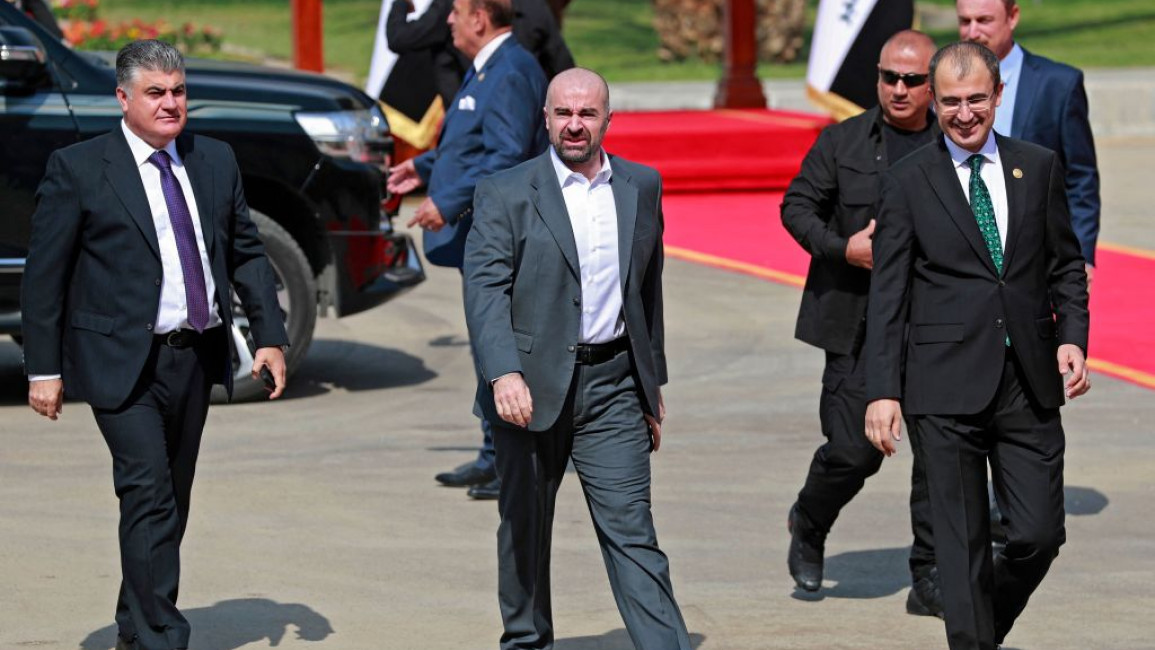Boycotts, factional tensions overshadow Iraqi Kurdistan ruling party's conference
As the Patriotic Union of Kurdistan (PUK), a prominent ruling party in the Iraqi Kurdistan region launched its fifth conference, the political landscape within the party remains tumultuous.
The PUK kicked off with its fifth conference on Wednesday, 27 September, in the city of Sulaimaniyah and was attended by several Kurdish and Iraqi politicians.
But discord among veteran leaders and the current party head, Bafel Talabani, son of the late Jalal Talabani, cast a long shadow over the event. The disputes revolve around Bafel Talabani's consolidation of authority within the party and his alliances with armed factions, producing one of the most turbulent periods for the party since its inception in the 1970s.
On Wednesday, Bafel Talabani secured his position as the party's leader with a majority vote from the party's congress, as reported by PUK media outlets. The New Arab contacted Talar Sheikh Latif, the spokesperson for PUK's fifth congress, for comment, but she was not immediately available.
Inside Day one of PUK's fifth Congress 👇
— Esta (@Esta__English) September 28, 2023
The Congress commenced with great enthusiasm from the party members on Wednesday.
The inaugural day witnessed speeches by @Bafeltalabani & @IKRPresident, emphasizing the need for Kurdish unity in the current challenging times... pic.twitter.com/2cmLA1nEcA
A senior PUK official, speaking anonymously, said to TNA that Bafel Talabani's reelection occurred without any other competing candidates during the three-day conference.
Furthermore, senior leadership officials were prohibited from speaking to the press.
Before the party's congress, Mullah Bakhtiar, a seasoned PUK leader, announced he will boycott the meeting through a video on his official Facebook page. He blamed Bafel Talabani for the boycott and the absence of some leaders from the PUK's High Council and claimed that most current conference members were "identified" rather than elected, contrary to the party's bylaws.
Soon after, during an interview with Al-Araby Al-Jadeed, Bakhtiar emphasised, "The party is experiencing fundamental disagreements that have led us into a dark and closed tunnel. We have studied the current situation within the party, and we found that the final result of the fifth congress will be a failure similar to the party's fourth conference."
He also raised concerns about the lack of clear agreements with parties in Baghdad or the Kurdistan region to safeguard Kurdish rights and accused Bafel Talabani of exerting undue control over the party.
Conversely, former PUK co-president Lahur Sheikh Jangi announced his exit from the party's ranks in a recorded video and further pledged to create his electoral list for the Kurdistan region's parliamentary elections scheduled for 25 February 2024.
Sheikh Jangi also held Bafel Talabani responsible for the party's splintering and warned of future tensions among its factions.
Iraq's former president and a prominent PUK member, Barham Salih, could not participate in the conference due to his travels abroad. However, a close source confirmed that Salih remains a party member.
The conference elected a new leadership committee on Thursday and is set to conclude on Friday.
The PUK is a significant ruling party in the Kurdistan Regional Government (KRG) and a member of the Socialist International Organisation. It was founded in 1975 by several Kurdish politicians, including Jalal Talabani, who became the party's secretary-general and then president of Iraq. Talabani passed away on 3 October 2017 in Germany, following a long treatment period after a stroke in 2012. Talabani, 83, was Iraq's president from 2005 to 2014.
PUK members elected Lahur Jangi and Bafel Talabani, the nephew and elder son of late Talabani, respectively, as party co-leaders in 2020.
However, in July 2021, the party's co-presidents were feuding over who should run the party. Bafel removed the heads of the PUK's counter-terrorism and intelligence forces – both overseen by Jangi – and appointed new heads for both organisations.



